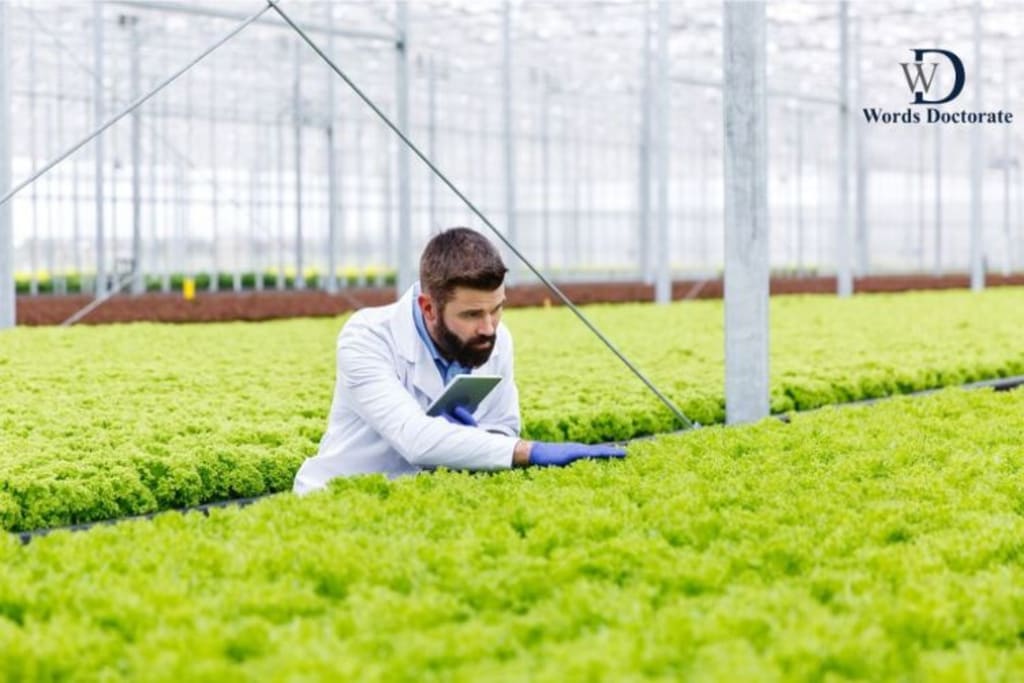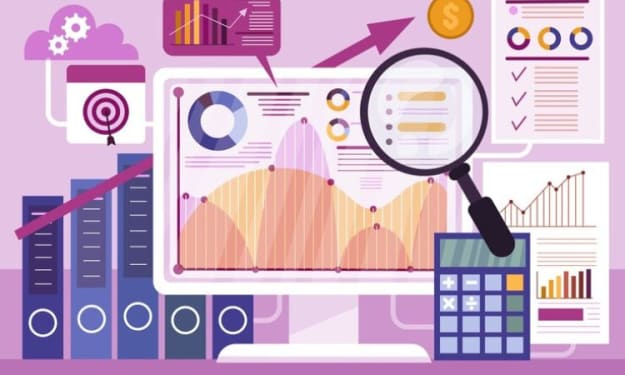Cultivating Knowledge: Big Data Applications In Agricultural Research In Hawalli, Kuwait
Big Data Applications In Agricultural Research

Abstract:
The agriculture sector in Hawalli, Kuwait, stands on the precipice of transformation with the advent of big data technologies. This paper delves into the burgeoning field of big data applications in agricultural research, specifically tailored to the unique landscape of Hawalli. It explores how harnessing large volumes of data generated by farms, weather stations, and IoT devices can revolutionize farming practices, optimize resource allocation, and enhance crop yield and quality. By examining current applications, challenges, and future directions, this paper aims to provide insights into the potential of big data to propel agricultural innovation and sustainability in Hawalli.
Introduction:
Agricultural players in Hawalli are confronted with the twin problem of boosting productivity while reducing environmental effects as the world's food demand continues to rise. In this context, actionable insights from the study of large datasets are provided by big data technologies, which present hitherto unseen prospects to revolutionize conventional farming techniques. The uses of big data in agriculture are numerous and extensive, ranging from supply chain optimization and market forecasts to precision farming and predictive analytics. Researchers and practitioners in Hawalli are using these technologies to take advantage of new opportunities in the agriculture sector and to address local difficulties.
Applications Of Big Data In Agriculture:
There are many different areas in which big data applications are used in agriculture, and each one presents a different chance to improve sustainability, production, and efficiency. Researchers in Hawalli are using precision agriculture techniques to monitor crop health, identify pests and diseases, and optimize irrigation and fertilization schedules. They are doing this by utilizing satellite imaging, drones, and Internet of Things sensors. Additionally, supply chain interruptions are minimized, crop yields are predicted, and planting decisions are optimized through the use of advanced analytics and machine learning algorithms. Big data analytics is also helping farmers make informed decisions and optimize profitability by offering price predictions and market knowledge. This use case study only scratches the surface of big data's revolutionary possibilities in Hawalli agriculture.
Challenges And Opportunities:
While big data has enormous promise in agriculture, several difficulties must be overcome before its full benefits can be realized in Hawalli. These include the requirement for infrastructure development and capacity building, data privacy and security concerns, and challenges with data integration and interoperability. Furthermore, implementing big data technology calls for a paradigm change in company culture and mindset, which calls for funding for campaigns to raise awareness and provide education and training. But there are also chances for innovation and research because of these difficulties. Hawalli has the opportunity to establish itself as a leader in agricultural data analytics and promote resilience and sustainable growth in the industry by creating strong data governance frameworks, encouraging stakeholder collaboration, and allocating resources towards technology infrastructure.
Future Directions:
Looking ahead, the future of big data in agriculture in Hawalli is full of opportunities. New technologies that have the potential to improve data collecting, analysis, and decision-making processes include edge computing, blockchain, and the Internet of Things (IoT). Furthermore, customized farming methods catered to regional conditions can be made possible by the integration of genetic data, soil sensors, and weather forecasts, which will maximize output while reducing environmental effect. Additionally, by utilizing machine learning and artificial intelligence, researchers can get a new understanding of crop genetics, insect control, and soil health, opening the door to more resilient and sustainable agricultural systems in Hawalli.
What Are The Main Challenges Of Implementing Big Data In Agriculture In Kuwait?
The main challenges of implementing big data in agriculture in Kuwait include:
Data Quality and Standardization: Because different sources have varying formats, degrees of accuracy, and dependability, it can be challenging to ensure the quality and standardization of data from these sources, including satellite imaging, drones, and Internet of Things sensors.
Limited Knowledge and Skills: It's possible that a large number of Kuwaiti farmers and other agriculture sector participants are unaware of the possible advantages of big data or lack the knowledge and experience necessary to properly gather and analyze the data.
Cost and ROI: It might be difficult to guarantee a positive return on investment (ROI) when gathering and analyzing large amounts of data, especially for small farmers or those with limited resources.
Technological Challenges: Especially for transdisciplinary research in agriculture and nutrition, managing and interpreting vast amounts of data requires high-end technology, which can be expensive and complex to administer.
Data Integration: In the context of the Internet of Things (IoT) and other technologies, integrating data from several sources and guaranteeing interoperability can be extremely difficult.
Cybersecurity: Safeguarding privacy and data security is essential for big data applications, especially given Kuwait's expanding use of AI and big data across a range of industries, including healthcare and education.
What Are The Most Common Data Sources Used By Farmers In Kuwait?
The most common data sources used by farmers in Kuwait include:
Public Authority of Agriculture and Fisheries (PAAF): PAAF provides data on agricultural practices, soil quality, and water resources to farmers, which helps them make informed decisions about their crops and farming methods.
International Centre for Agricultural Research in the Dry Areas (ICARDA): ICARDA provides data on farming technologies, training, and workshops to farmers, which helps them improve their farming practices and increase yields.
Kuwait Foundation for the Advancement of Sciences (KFAS): KFAS provides data on agricultural research and development, which helps farmers stay updated on the latest techniques and technologies in agriculture.
Kuwait Institute for Scientific Research (KISR): KISR provides data on agricultural research and development, which helps farmers stay updated on the latest techniques and technologies in agriculture.
Kuwait Fund for Arab Economic Development (KFAED): KFAED provides data on agricultural development projects, which helps farmers access resources and funding for their agricultural activities.
Supreme Council for Planning and Development (SCPD): SCPD provides data on agricultural planning and development, which helps farmers stay updated on the latest policies and initiatives in the agricultural sector.
World Bank: The World Bank provides data on agricultural development indicators, which helps farmers stay updated on the latest trends and statistics in the agricultural sector.
United States Department of Agriculture (USDA): USDA provides data on agricultural reports and trade statistics, which helps farmers stay updated on the latest trends and statistics in the agricultural sector.
Benefits Of Hiring A Freelance Expert For Big Data In Agriculture Research
There are a number of advantages to hiring a freelancer with experience in big data for agricultural research, including:
Cost-Effective: When compared to full-time employees, freelance professionals can offer competitive prices, which makes them a more cost-effective choice for projects with tight budgets.
Specialized abilities: For projects requiring a certain set of technical abilities, freelance specialists can be especially helpful because they frequently have specialized knowledge and experience in particular areas of big data, such as data analysis, machine learning, or data visualization.
Flexibility: Project-by-project employment by freelance specialists allows for flexibility in project scope, schedule, and budget.
Access to a Larger Network: You're more likely to locate the ideal expert for your project when you use freelance platforms like Kolabtree and Guru, which provide you access to a larger network of professionals.
Decreased Administrative Burden: Since freelance specialists take care of their own tax and billing, your company will have less administrative work to do.
Enhanced Quality: To preserve their reputation and develop a solid portfolio, freelance professionals are frequently driven to produce high-quality work, guaranteeing that your project will be completed to the highest standard.
Enhanced Productivity: Since freelance professionals can work on several projects at once, they can manage their workload more effectively and finish projects faster.
Access to the Newest Technologies: Freelancers frequently keep abreast of the newest big data tools and technologies, so your project will profit from the most recent developments.
Improved Collaboration: Experts working remotely can work with your team to ensure that everyone is in agreement and to facilitate communication.
Risk-Free: You may work with a freelance specialist without worrying about the possible hazards involved with hiring a full-time employee thanks to freelance platforms like Kolabtree and Guru, which provide a risk-free environment.
In Conclusion:
To sum up, big data applications in agriculture signify a paradigm shift in Hawalli's farming practices. Through the utilization of data analytics, stakeholders may effectively allocate resources, improve productivity, and manage risks to safeguard the agricultural sector's long-term sustainability and resilience. To address current issues and seize new opportunities, governments, researchers, farmers, and industry partners must work together to realize this goal. Hawalli can use big data to create a more lucrative and sustainable future for its agricultural sector, guaranteeing food security and wealth for future generations, if the proper approach and group effort are put in place.
About the Creator
Enjoyed the story? Support the Creator.
Subscribe for free to receive all their stories in your feed. You could also pledge your support or give them a one-off tip, letting them know you appreciate their work.





Comments
There are no comments for this story
Be the first to respond and start the conversation.